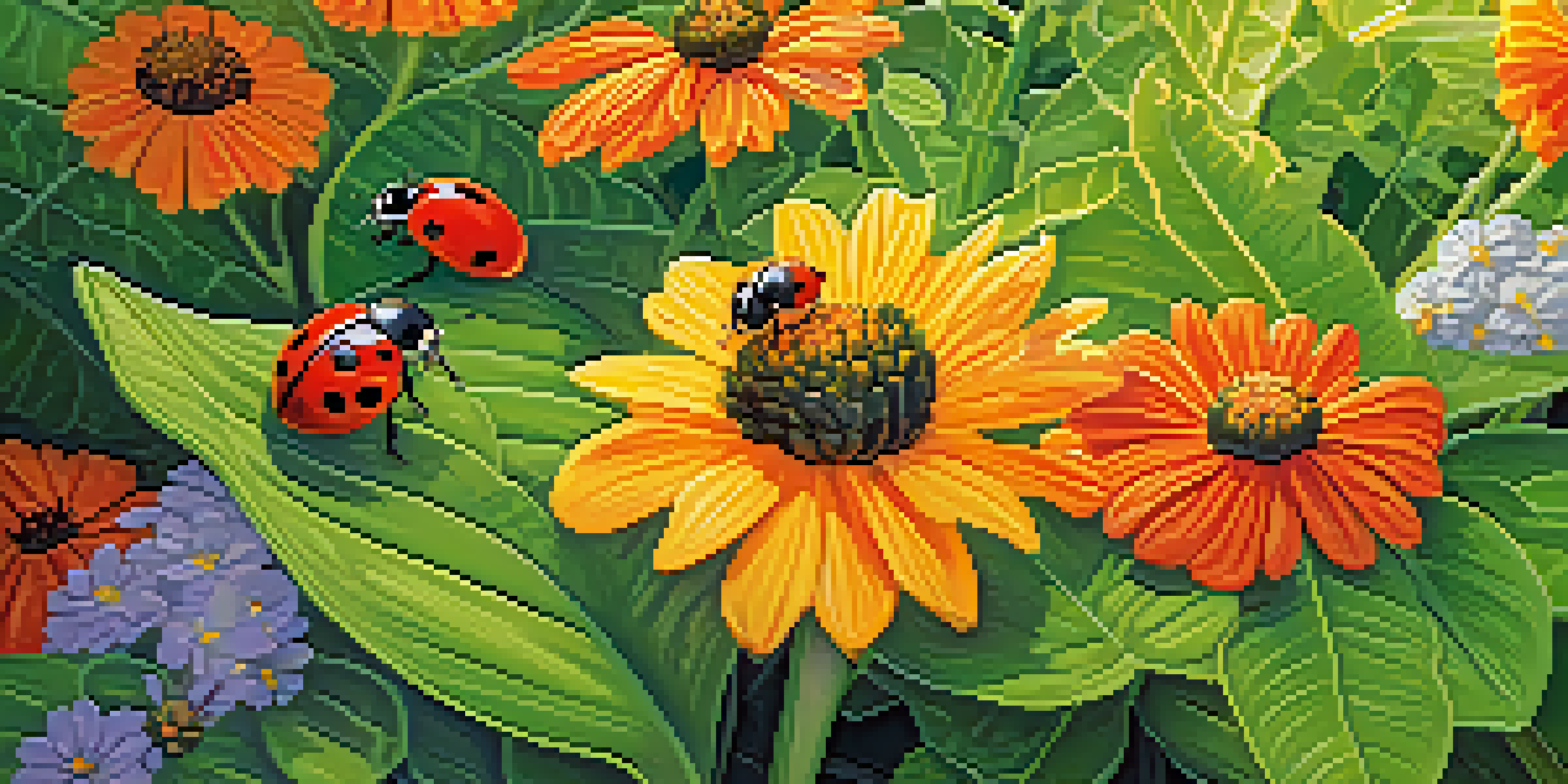Organic Pest Control Methods for Home Gardens

Understanding Organic Pest Control: The Basics
Organic pest control refers to methods that manage pests without synthetic chemicals. This approach is essential for maintaining a healthy ecosystem in your garden and ensuring that your plants thrive naturally.
Healthy plants are better able to withstand pest pressure and recover from damage.
By using organic pest control, you not only protect your plants but also contribute to a more sustainable environment. It's about working with nature, utilizing natural predators, and employing eco-friendly solutions.
An understanding of organic pest control can help you create a thriving garden that is free from harmful chemicals, making it safer for your family and pets.
Identifying Common Garden Pests
Before you can effectively manage pests, you need to identify which ones are invading your garden. Common pests include aphids, caterpillars, and spider mites, each with distinct characteristics.

For example, aphids are tiny, soft-bodied insects that often cluster on the undersides of leaves, while caterpillars can be more visible, munching on your plants' leaves. Knowing what you're dealing with is half the battle.
Embrace Organic Pest Control
Using organic methods helps protect plants and promotes a sustainable environment.
Once you've identified the pests, you can choose the most effective organic methods for control, tailored specifically to the type of pest you're facing.
Natural Predators: Allies in Your Garden
One of the most effective organic pest control methods is harnessing the power of natural predators. Ladybugs, for instance, are known for their appetite for aphids, making them a gardener's best friend.
The best way to control pests is to encourage their natural enemies.
Introducing beneficial insects can help keep pest populations in check without harming your plants. You can attract these allies by planting flowers like marigolds or dill, which provide food and habitat.
By fostering a balanced ecosystem in your garden, you allow these predators to thrive, creating a natural defense against pests.
Homemade Sprays: Simple Solutions
Homemade sprays can be a game-changer in your organic pest control arsenal. A simple mixture of soap and water can deter soft-bodied insects like aphids and mites when sprayed directly onto them.
Another effective option is a garlic or chili spray, which can repel a variety of pests due to its strong odor and taste. Just blend garlic or chili peppers with water, strain, and spray away!
Utilize Natural Predators
Introducing beneficial insects like ladybugs can naturally control pest populations in your garden.
These homemade solutions are not only easy to make but also cost-effective, giving you the power to protect your garden without breaking the bank.
Companion Planting: Nature’s Teamwork
Companion planting is a fascinating organic method that involves planting certain plants together to naturally deter pests. For example, marigolds are known to repel nematodes, while basil can help ward off flies and mosquitoes.
By strategically selecting companion plants, you can create a natural pest deterrent that enhances biodiversity. This method not only protects your crops but can also improve overall plant health and yield.
Understanding which plants work well together creates a symbiotic relationship, making your garden resilient against pest invasions.
Physical Barriers: Keeping Pests at Bay
Sometimes, the simplest solutions are the most effective, and physical barriers are a prime example. Using row covers, nets, or even simple screens can protect your plants from pests without any chemicals.
These barriers create a physical shield against insects while still allowing sunlight and rain to nourish your plants. They are particularly useful for young seedlings that are vulnerable to insect damage.
Monitor and Adapt Strategies
Regularly inspecting your garden and adjusting pest control methods is crucial for long-term effectiveness.
By incorporating physical barriers into your pest control strategy, you can significantly reduce pest problems while maintaining an organic approach.
Maintaining Soil Health: A Preventive Measure
Healthy soil is the foundation of a thriving garden, and maintaining its health is crucial for pest control. Rich, nutrient-dense soil supports strong plant growth, making them less susceptible to pest infestations.
Incorporating organic matter like compost can improve soil structure and fertility, fostering a vibrant ecosystem. Healthy plants not only resist pests better but also recover quicker from any damage.

Investing time in soil health is an investment in your garden's long-term resilience against pests.
Monitoring and Adjusting: A Continuous Process
Effective organic pest control is not a one-time fix; it requires ongoing monitoring and adjustments. Regularly inspecting your garden allows you to catch pest problems early before they escalate.
Keep a garden journal to track pest sightings, weather conditions, and the effectiveness of your chosen methods. This can help you adapt your strategies based on what works best in your specific environment.
By staying vigilant and flexible, you can ensure your organic pest control methods remain effective throughout the growing season.